unit讲义7国际海洋货物运输
- 格式:ppt
- 大小:2.59 MB
- 文档页数:44
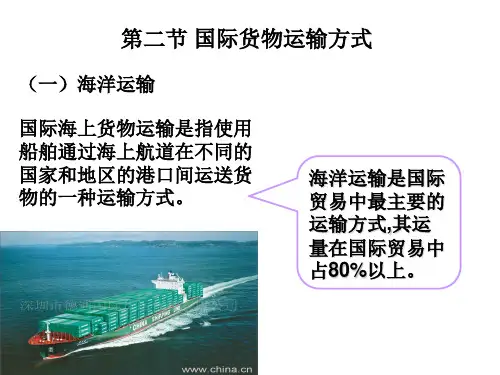
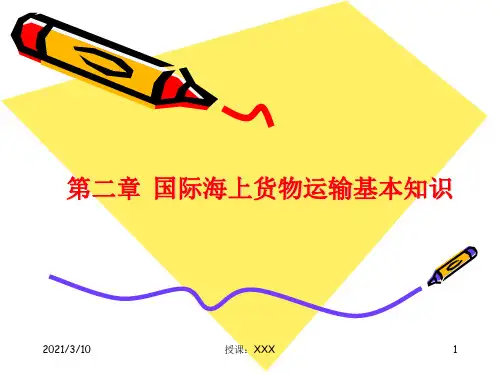
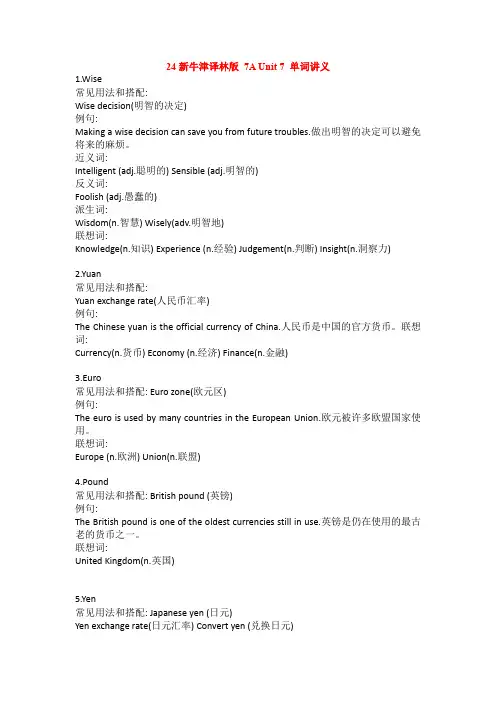
24新牛津译林版7A Unit 7 单词讲义1.Wise常见用法和搭配:Wise decision(明智的决定)例句:Making a wise decision can save you from future troubles.做出明智的决定可以避免将来的麻烦。
近义词:Intelligent (adj.聪明的) Sensible (adj.明智的)反义词:Foolish (adj.愚蠢的)派生词:Wisdom(n.智慧) Wisely(adv.明智地)联想词:Knowledge(n.知识) Experience (n.经验) Judgement(n.判断) Insight(n.洞察力)2.Yuan常见用法和搭配:Yuan exchange rate(人民币汇率)例句:The Chinese yuan is the official currency of China.人民币是中国的官方货币。
联想词:Currency(n.货币) Economy (n.经济) Finance(n.金融)3.Euro常见用法和搭配: Euro zone(欧元区)例句:The euro is used by many countries in the European Union.欧元被许多欧盟国家使用。
联想词:Europe (n.欧洲) Union(n.联盟)4.Pound常见用法和搭配: British pound (英镑)例句:The British pound is one of the oldest currencies still in use.英镑是仍在使用的最古老的货币之一。
联想词:United Kingdom(n.英国)5.Yen常见用法和搭配: Japanese yen (日元)Yen exchange rate(日元汇率) Convert yen (兑换日元)The Japanese yen is widely used in Asia.日元在亚洲广泛使用。

2024新教材七年级上册Unit7单词讲义1.celebrate [səˈpraɪz] v .庆祝;庆贺p67➢词形变换:celebration [ˌselɪˈbreɪʃn] n. 庆祝;庆典;庆祝活动The celebration of the festival was very lively.这个节日的庆祝活动非常热闹。
Let's celebrate with a big party.让我们用一个盛大的聚会来庆祝。
➢趁热打铁:①今晚将有一个庆祝派对。
There will be tonight.②我们每年都庆祝她的生日。
We every year.③我们为什么要庆祝生日呢?(课文原句)?2.surprise [səˈpraɪz] n. 惊奇;惊讶; v. 使感到意外➢固定搭配:in surprise惊讶地to one's surprise令某人惊讶的是What a big surprise! 多么大的一个惊喜啊!His words surprised me. 他的话让我感到惊讶。
She looked at me in surprise. 她惊讶地看着我。
➢趁热打铁:①令我惊讶的是,他通过了考试。
, he passed the exam.②为他举办一个惊喜派对怎么样(课文原句) ?3.something [ˈsʌmθɪŋ] pron. 某事;某物There is something wrong with the machine. 机器出了点问题。
I want to eat something sweet.我想吃点甜的东西。
➢规律总结:当形容词修饰something等不定代词时后置➢趁热打铁:①他说了些有趣的事。
He said .②让我们去为聚会买点东西吧(课文原句) .4.sale [seɪl] n .出售;销售➢固定搭配:on sale出售;打折;for sale待售➢词性转换:sell [sel] v.出售;售卖;推销sell sth. to sb. /sell sb. sth. 把某物卖给某人There are many things on sale in the store.商店里有很多东西在打折。
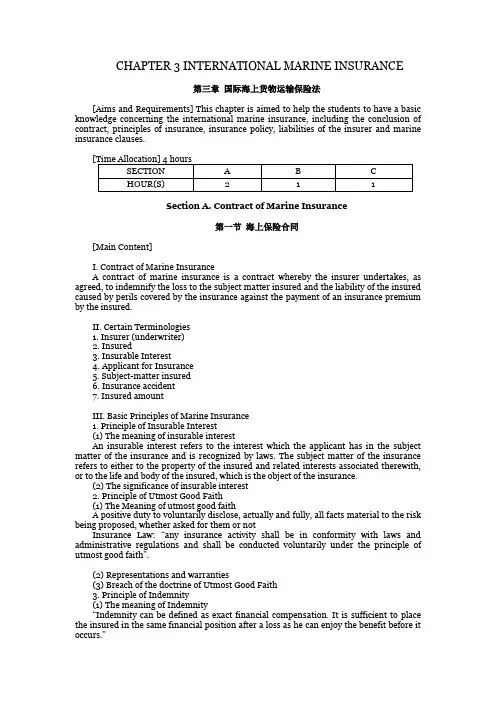
CHAPTER 3 INTERNATIONAL MARINE INSURANCE第三章国际海上货物运输保险法[Aims and Requirements] This chapter is aimed to help the students to have a basic knowledge concerning the international marine insurance, including the conclusion of contract, principles of insurance, insurance policy, liabilities of the insurer and marine insurance clauses.Section A. Contract of Marine Insurance第一节海上保险合同[Main Content]I. Contract of Marine InsuranceA contract of marine insurance is a contract whereby the insurer undertakes, as agreed, to indemnify the loss to the subject matter insured and the liability of the insured caused by perils covered by the insurance against the payment of an insurance premium by the insured.II. Certain Terminologies1. Insurer (underwriter)2. Insured3. Insurable Interest4. Applicant for Insurance5. Subject-matter insured6. Insurance accident7. Insured amountIII. Basic Principles of Marine Insurance1. Principle of Insurable Interest(1) The meaning of insurable interestAn insurable interest refers to the interest which the applicant has in the subject matter of the insurance and is recognized by laws. The subject matter of the insurance refers to either to the property of the insured and related interests associated therewith, or to the life and body of the insured, which is the object of the insurance.(2) The significance of insurable interest2. Principle of Utmost Good Faith(1) The Meaning of utmost good faithA positive duty to voluntarily disclose, actually and fully, all facts material to the risk being proposed, whether asked for them or notInsurance Law: “any insurance activity shall be in conformity with laws and administrative regulations and shall be conducted voluntarily under the principle of utmost good faith”.(2) Representations and warranties(3) Breach of the doctrine of Utmost Good Faith3. Principle of Indemnity(1) The meaning of Indemnity“Indemnity can be defined as exact financial compens ation. It is sufficient to place the insured in the same financial position after a loss as he can enjoy the benefit before it occurs.”In other words, when claims occur in property insurance, the insurer will pay the claims to the insured if the damage or loss is covered by the policy conditions.(2) Measurement of indemnity(3) Factors limiting the payment of indemnity4. Principle of Proximate Cause(1) The Meaning of proximate cause“Proximate cause is an active and efficient cause that sets a trai n of events in motion and brings about a result. If there are several causes operating simultaneously, the proximate one will be the dominant or the most forceful one operating to bring a result.(2) Occurrence of trains of event(3) How do we determine the efficient cause?IV. The Conclusion of Marine Insurance ContractV. Insurance Policy1. Function of the Policy2. Assignment of the Policy3. Floating Policy & Open Cover[Key Points and Difficult Points]1. Insurable Interest2. Utmost Good Faith3. Open Cover[Questions]1. Describe different types of insurable interests.2. What is utmost good faith?3. What are the functions of Policy?Section B. Obligation of the Insurer and Insured第二节保险人与被保险人的义务[Main Content]I. Obligations of the Insured1. The insured shall pay the premium immediately upon conclusion of the contract.2. The insured shall notify the insurer in writing immediately where the insured has not complied with the warranties under the contract.3. Upon the occurrence of the peril insured against, the insured shall notify the insurer immediately and shall take necessary and reasonable measures to avoid or minimize the loss.II. Liability of the Insurer1. The insurer is responsible for the issue of insurance policy.2. The insurer shall indemnify the insured promptly after the loss from a peril insured against has occurred.3. But the insurer is not liable for the loss or damage rising from any of the following causes:(1) Delay in the voyage or in the delivery of cargo or change of market price;(2) Fair wear and tear, inherent vice or nature of the cargo;(3) Improper packing.III. Perils under Marine Insurance1. Natural calamitiesSuch as weather, thunder and lighting, tidal wave, earthquake, floods, etc.2. Fortuitous accidentsSuch as ship stranded, striking upon the rocks, ship sinking, ship collision, colliding with icebergs, fire, explosion, etc.3. Extraneous risksThis cover theft, rain, shortage, leakage, breakage, dampness, etc. They may include special risks, such as war risks, strikes, non-delivery of cargo, refusal t receive cargo, etc.IV. Losses covered by Marine Insurance1. Total loss(1) Actual total loss(2)Constructive total loss2. Partial loss(1) General Average(2) Particular Average[Key Points and Difficult Points]1. Obligations of the insured2. Liability of the insurer3. Constructive total loss4. General Average5. Abandonment[Questions]1. What is abandonment? Does the insurer have the obligation to accept abandonment?2. What are the differences between actual total loss and constructive total loss?3. What does General Average refer to? Please give an example.Section C Marine Insurance Clauses第三节海上保险合同条款[Main Content]I. Marine Insurance Clauses1. London Institute Cargo Clause (ICC)(1) Institute Cargo Clause A(2) Institute Cargo Clause B(3) Institute Cargo Clause CEXCLUSIONS2. PICC Ocean Marine Cargo ClausesAccording to the stipulat ions of the People’s Insurance Company of China, the following basic insurance covers are available in marine insurance:(1) Free From Particular Average (FPA)Under FPA the insurance company will be resposible to pay claims for total or constructive total losses suffered by the whole lot of cargoes during transportation due to such natural calamities as vile weather, thunder and lighting, tidal wave, earthquakes, and floods, ot for total or partial losses due to the ship or carrier being on fire, stranded, sinking, colliding or meeting other fortuitous accidents.(2) With Particular Average (WA)The cover of this insurance is more extensive. The insurer is liable, in addition to the total or constructive total losses covered by FPA insurance, also for the partial losses of the insured goods due to the risks caused by natural calamities not mentioned under FPA.(3) All RisksUnder an “all risks” policy the goods are insured against all risks, e.g. from natural calamities, fortuitous accidents at sea, or general extraneous risks, irrespective of percentage of loss, total or partial. A natural deterioration of perishable goods, delay, loss or damage caused by inherent vice nature of the subject matter are not covered.EXCLUSIONSPICC Cargo Clauses do not cover:(1) Loss or damage caused by the intentional act or fault of the Insured.(2) Loss or damage falling under the liability of the consignor.(3) Loss or damage arising from the inferior quality or shortage of the insured goods prior to the attachment of this insurance.(4) Loss or damage arising from normal loss, inherent vice or nature of the insured goods, loss of market and/or delay in transit and any expenses arising therefrom.(5) Risks and liabilities covered and excluded by the Ocean Marine Cargo War Risks Clauses and Strike, Riot and Civil Commotion Clauses.3. War Risks Clause & Strike Risks Clause(1)Institute Cargo Clause-War(2) Strike ClauseII. Commencement and Termination of Cover (warehouse to warehouse) seagoing vessel at the final port of discharge before they reach the above mentioned warehouse or place of storage. If prior to the expiry of the above mentioned sixty (60) days, the insured goods are to be forwarded to a destination other than that named in the Policy, this insurance shall terminate at the commencement of such transit.[Key Points and Difficult Points]1. FPA2. WA3. All Risks[Questions]1. When will the Cover be terminated?2. What is Free From Particular Average?。
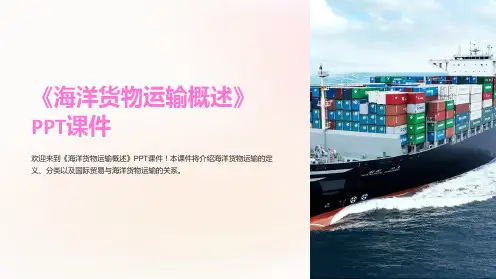
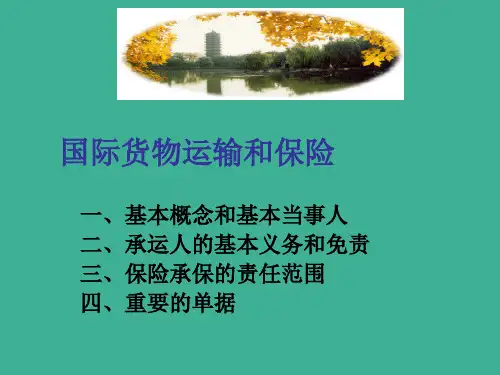
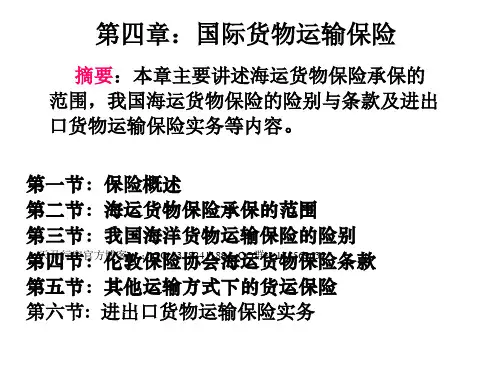


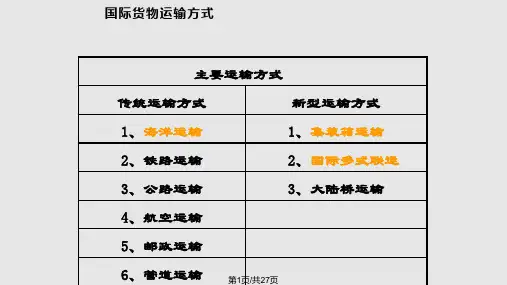
第五章国际货物运输与保险5.1本章要点■国际海上货物运输■国际航空货物运输■国际铁路货物运输■国际多式联运■国际货物运输保险5.2重点难点导学一、国际海上货物运输1.提单(Bill of Lading,B/L)(1)提单的定义和作用提单是一种用以证明海上运输合同和货物已由承运人接管或装船,以及承运人保证凭以交付货物的单据。
提单的作用有三种:①提单是托运人与承运人之间订有运输合同的凭证。
②提单是承运人从托运人处收到货物的凭证。
③提单是代表货物权利的凭证。
承运人在收到货物并签发提单之后,负有在目的地只向提单持有人交付货物的义务。
作为权利凭证,提单可以进行买卖和自由转让。
(2)提单的种类①以货物是否装船,分为已装船提单(Shipped B/L或on Board B/L)和收货待运提单(Received for Shipment B/L)。
②以提单上是否有不良批注,分为清洁提单(Clean B/L)和不清洁提单(Unclean B/L 或Foul B/L)。
③按收货人抬头,分为记名提单(Straight B/L)、不记名提单(Open B/L)和指示提单(Order B/L)。
④按运输方式,分为直达提单(Direct B/L)、转船提单或联运提单(Transshipment B/L 或Through B/L)和多式联运单据(或提单)或联合运输单据(Combined transport document or B/L或Multimodal transport document or B/L)。
⑤按运费支付的时间,分为运费预付提单(Freight prepaid B/L)和运费到付提单(Freight payable at destination B/L)。
⑥班轮运输提单和租船提单。
【例】提单(B/L)[中山大学2010年研;南京财经大学2009年研]、Bill of Lading[上海交大2005年研](3)承运人和托运人的权利义务①承运人的责任a.承运人须在开航前和开航时恪尽职责使船舶适航;b.适当和谨慎地装载、搬运、配载、运送、保管、照料和卸载所运货物。
九年级(全)Units 7-8重点表达Unit 71.license n.(=licence) 证; 证件driver's license 驾驶执照2. part-time adj.& adv.兼职(的)3. pierce v.扎;刺破;穿透4. earring n. 耳环; 耳饰5. flash n.闪光灯;闪光v闪耀;闪光6. tiny adj.极小的;微小的7. cry v.& n.哭; 叫喊cry out大叫; 叫喊8. field n.田野;场地9. hug n.& v.拥抱; 搂抱10. lift v.举起;抬高n.电梯;搭便车give ... a lift 捎……一程lift up..举起11. talk back 回嘴;顶嘴12. awful adj.很坏的;讨厌的13. community n.社区;社团14. chance n.机会;可能性by chance..偶然15. make one's own decision自己做决定16. get in the way of 挡……的路;妨碍17. support v.& n.支持Unit 81. truck n.卡车;货车2. picnic n.野餐go for a picnic去野餐have a picnic去野餐3. rabbit n.兔;野兔4. attend v. 出席; 参加5. pink adj.粉红色的n.粉红色6. anybody pron.任何人7. policeman n. (pl. policemen) 男警察8. wolf n. (pl. wolves) 狼9. laboratory n.实验室10. outdoors ad:在户外;在野外11. coat n.外套;外衣12. land v.着陆;降落n.陆地13. alien n.外星人14. run after追逐;追赶15. circle n.圆圈v圈出16. Britain (=Great Britain)大不列颠17. receive v.接待;接受;收到18.temple n. 庙宇; 寺院; 圣殿19. midsummer n.仲夏;中夏20. purpose n.目的;目标on. purpose 故意;...有意地21. prevent v阻止;阻挠prevent sb. (from) doing sth. 防止某人做某事22. position n.位置;地方23. honor (=honour) v.尊重;表示敬意n.荣幸;荣誉24. ancestor n.祖宗;祖先25. victory n.胜利;成功26. enemy n.敌人;仇人27. period n.一段时间;时期词汇拓展1. smoke v.吸烟;冒烟n.烟→smoker n.吸烟者2.regret v.& n. 感到遗憾; 懊悔→regretful adj.遗憾的;后悔的regret doing sth. 后悔做了某事regret to do sth. 对要做的事感到遗憾3. poem n.诗;韵文→poet n.诗人→poetry n.诗歌(总称)4. manage v.完成(困难的事);应付(困难局面)management n.管理;经营→manager n.经理manage to do sth.设法做成某事5.enter v.进来;进去entry n.进入entrance n.入口6. valuable adj.贵重的:很有用的:宝贵的→value n.价值v重视;珍视→valueless adj.无价值的7. suit n.西服;套装v.适合→suitable adj.合适的8. mystery n.奥秘;神秘事物→mysterious adj.神秘的9. energy n.力量;精力→energetic adj.精力充沛的10. burial n.埋葬;安葬→bury v.埋;埋葬重点句子1.Do you think we must keep teenagers away from the Internet?你认为我们必须让青少年远离网络吗?2.I don't think sixteen-year-olds should be allowed to drive.我认为不应该允许16岁的青少年开车。